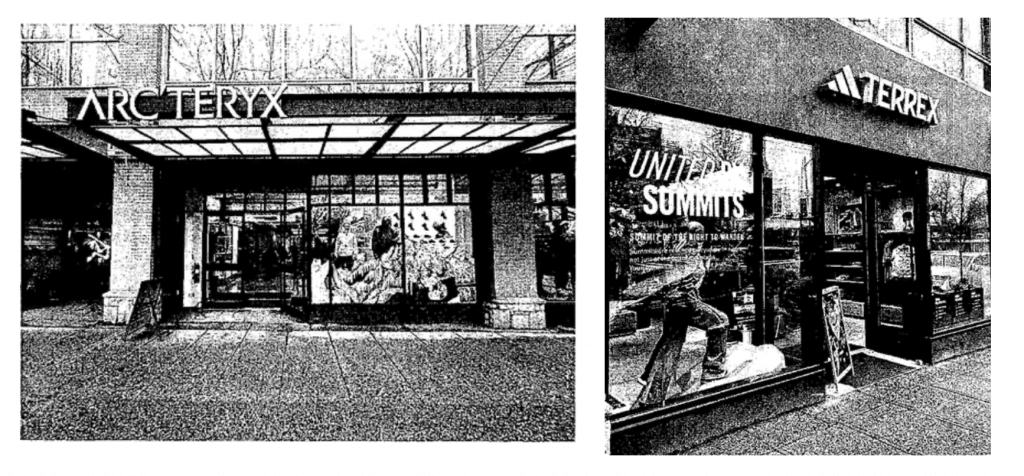Arc’teryx has beaten out adidas in the latest round of a “David and Goliath” trademark fight over the sportswear titan’s TERREX outdoors-wear brand. In a decision this week, the Supreme Court of British Columbia narrowly granted Arc’teryx’s bid for an interlocutory injunction to block adidas Canada from “using TERREX as the name of its retail stores” in Canada on the basis that consumers are likely to be confused about whether the two stores are related. The court refused to go as far as Arc’teryx was hoping and instead, limited the breadth of the injunction to a single adidas TERREX store in the Kitsilano area of Vancouver – where the signage consists exclusively of adidas 3-stripe logo and the word TERREX – and refused to apply it to any of adidas’ online retail store services.
For a bit of background: On the heels of adidas opening a TERREX-branded store down the street from one of Arc’teryx’s store in Vancouver in January 2023, Arc’teryx filed a trademark infringement lawsuit against adidas, citing its registration for the Arc’teryx mark for use in connection with retail store services and online retail store services in Canada (Class 35). In its complaint in February 2023, Arc’teryx argued that in light of adidas’ use of the word TERREX on the store signage and its proximity to the Arc’teryx store is enough to create “consumer confusion” between the two stores.

35-year-old Arc’teryx has claimed that the name “adidas” does not appear anywhere on the storefront signage, and noted that at numerous other adidas TERREX locations, including other stores in the Vancouver area, the adidas logo is accompanied on store signage by the name “ADIDAS” underneath. It also argued that while adidas filed a trademark application for TERREX for use in Class 35, that application is still pending.
An Injunction for Arc’teryx
Setting the stage in his order, Honorable Justice Kent stated that in order to determine if an injunction is warranted, the court must use a three-pronged test to decide whether: (1) the applicant demonstrates a serious question to be tried, in the sense that the application is neither frivolous nor vexatious; (2) the litigant who seeks the interlocutory injunction would, unless the injunction is granted, suffer irreparable harm; and (3) which of the two parties will suffer the greater harm from the granting or refusal of an interlocutory injunction, pending a decision on the merits.
Neither frivolous nor vexatious – Turning to the first prong into the test, the court held that this requires “a preliminary investigation of the merits to decide whether the applicant demonstrates a serious question to be tried, in the sense that the application is neither frivolous nor vexatious.” This factor weighs in favor of Arc’teryx, per Justice Kent, as its claim is neither frivolous nor vexatious. In furtherance of his finding, Kent stated that “when one places an image of the [adidas’] Performance Bars [logo] and TERREX trademarks beside an image of the ARC’TERYX trademark, the similarity between the two and the potential for confusion is immediately obvious.” (The judge noted that confusion is “assessed as ‘a matter of first impression in the mind of a casual consumer somewhat in a hurry.’ one that does not closely examine the similarities and differences between the marks.”)
The court was seemingly persuaded by Arc’teryx’s production of evidence from private investigators who interviewed employees in the TERREX store down the street from the Arc’teryx store who “admitted that at least 100 or more people came into [adidas] the store mistaking it for the Arc’teryx store” and who said that “it is a common mistake for shoppers to get the two brands mixed up.” The court noted that adidas “of course disputes the accuracy and admissibility of this evidence and, among other things, tendered the evidence of a marketing research specialist” who surveyed relevant consumers and found that “exposure to the TERREX mark and logo does not cause confusion with the mark ARC’TERYX.”
Risk of irreparable harm – The second factor for granting an interlocutory injunction centers on “deciding whether the litigant who seeks the interlocutory injunction would, unless the injunction is granted, suffer irreparable harm,” according to the court. Arc’teryx made a few arguments on this front, including that casual consumers will be diverted away from its store into the adidas store, resulting in lost sales and loss of market share, and if its Arc’teryx trademark loses distinctiveness for use on retail store services, it “will be virtually impossible to regain.” The company cites in support of this conclusion the report of its marketing and brand management expert, Mr. Kincaid.
Justice Kent said that he found Kincaid’s assertion – namely, that “distinctiveness, once lost is virtually impossible to regain” and that “the impact on loss of emotional brand equity would be extremely difficult to quantify” – to be “logical” and “persuasive,” and “one that underlies the statutory protections against infringement that registration of a trademark bestows.” At the same time, he said that he was not “presently persuaded that this type of intellectual property trespass is capable of being fully remedied by an award of damages.” Regardless of the methodology underlying any approach to assessment, he said that “money may be a poor substitute for the uniqueness or distinctiveness of an original art form, even if the latter was created for commercial purposes. All the more so, perhaps, where, as here, David is pitted against Goliath in an already uneven contest.” (To be fair, this is not necessary a typical David v. Goliath scenario, as Arc’teryx’s parent, Amer Sport, which owns multiple sports and outdoor apparel brands, recently filed for a U.S. IPO that is expected to value the group at as much as $10 billion.)
Balance of the harm to the parties – The third factor to be applied in an application for interlocutory injunction relief is “a determination of which of the two parties will suffer the greater harm from the granting or refusal of an interlocutory injunction, pending a decision on the merits.” Ultimately finding that “the balance of convenience and particularly the public interest in protecting registered trademarks” weighs in favor the granting of an interlocutory injunction in this case, Justice Kent held that the combination of adidas’ logo with the TERREX trademark “has a similar appearance to the Arc’teryx trademark and appears to have caused some confusion among some casual consumers for which Arc’teryx may have a proper cause of action against adidas Canada, whether in tort or under the Trademarks Act.”
He also maintained that “adidas knew full well that it did not have a trademark registration … for its trademark TERREX when it opened its new store using the Performance Bars logo/TERREX combination as the store banner and expressly chose not to use the trademark ‘ADIDAS’ in that store banner, even though the store was located on the same block just a few doors down from the Arc’teryx store.” And still yet, “when questioned by the court during the hearing, whether it might be prepared to resolve matters by inserting the trademark ‘ADIDAS’ as part of the storefront banner in order to avoid possible confusion with their competitor down the street,” the court stated that “adidas Canada politely declined.”
With the foregoing in mind, Justice Kent sided with Arc’teryx and granted the injunction – albeit with the caveat that he does “not agree to the ‘reach’ they request.” These types of injunctions are “an extraordinary remedy and must be framed as narrowly as possible,” according to the judge, who held that he sees “no sensible reason for issuing any injunction directed to anything other than the retail store on W. 4th Ave. in Vancouver, [as] adidas Canada advised the court during the hearing that it has no intention of opening any more stores with the same banner pending trial until the conclusion of these proceedings.”
“Furthermore, I am not persuaded that any injunction is necessary with respect to [adidas’] online retail store services,” Justice Kent stated, “The only information in front of me during this hearing is that these services are provided on the adidas website. In other words, the customer has to access the adidas website in order to navigate to any TERREX product. In these circumstances, the notion of confusion between the adidas and the Arc’teryx online stores seems highly unlikely.”
THE BIGGER PICTURE: Not the only matter that pits adidas and Arc’teryx against one another, the parties are also facing off before the U.S. Patent and Trademark Office’s Trademark Trial and Appeal Board. On the heels of Arc’teryx filing its trademark suit against adidas’ Canadian subsidiary the company initiated an opposition proceeding in the U.S., in which it is looking to prevent adidas from amassing a registration for the TERREX word mark for use in connection with “retail store services featuring clothing, footwear,” etc. (Class 35). In that matter, Arc’teryx similarly argues that consumers are likely to be confused by adidas’ mark and thus, it will be damaged if it is registered.
In its answer in October, adidas admitted, among other things, that “it intends to offer retail store services under the TERREX mark in the United States in the future,” while denying that it has any “intention to be similar [to Arc’teryx] and confusing on storefronts” and that Arc’teryx “will be damaged by the issuance of a registration for the mark TERREX.”
The case is Amer Sports Canada Inc. v. Adidas Canada Limited, 2024 BCSC 3.











